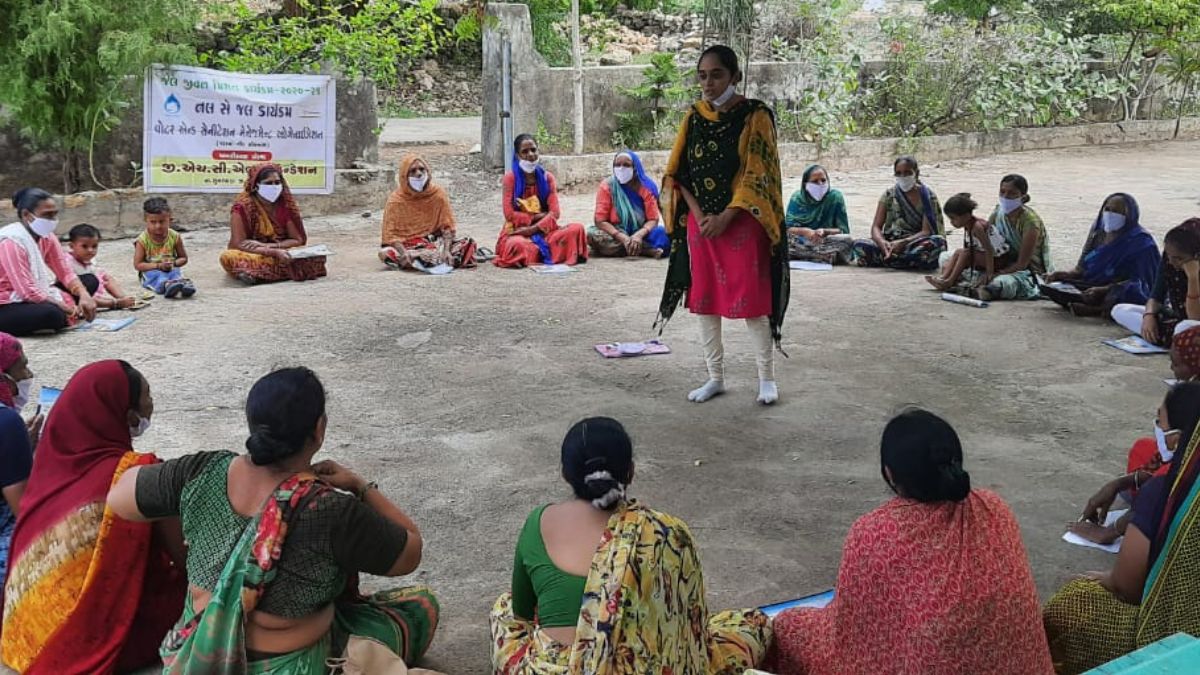GHCL Foundation forms SHGs and village committees to address water supply, microfinance, and self-reliance for rural women
The village of Alidhra in the Sutrapada taluka of the Gir-Somnath district is one location where the National Rural Drinking Water Programme has been successfully implemented

Advertisement
Ahmedabad : Gujarat is home to both dry and semiarid regions, making it difficult for some towns to get their hands on potable water. The GHCL Foundation, the company’s CSR arm, has implemented a number of programmes to improve the quality of life for women in the rural areas near its manufacturing facilities, with this goal in mind. These programmes centre on assisting rural women in becoming economically independent through community gatherings, skill development, and the formation of Self-Help Groups. (SHGs).

The village of Alidhra in the Sutrapada taluka of the Gir-Somnath district is one location where the National Rural Drinking Water Programme has been successfully implemented with the assistance of the GHCL Foundation. (NRDWP). It was difficult to get water from the tap in the village, both for drinking and for household use. Mr. N. N. Radia, President & COO (Soda Ash), GHCL, has said, “Any water problem will directly affect the lives of women.”
GHCL Foundation representatives met with the village women to discuss the issue and gain insight into the underlying causes of the problem. Sarpanch Harshaben’s support for the scheme’s introduction in the village helped GHCL overcome initial resistance.
“Women of the village came together to form the Mahila Pani Samiti and collected funds worth 10% of the total project cost and supervised and handled all the operations of laying the pipeline network. While implementing the project, GHCL Foundation representatives realised the lack of sanitation facilities. Once the household tap water connections were in place, GHCL Foundation once again roped in women of the village, contributing towards building toilets to make the village open defecation-free (ODF).” Added Mr. Radia
Empowering the rural communities through a series of initiatives around its plant locations has remained the focal point of GHCL Foundation’s efforts.
SHGs have remained long-sustaining models of driving a change in the rural areas. Over the years, GHCL Foundation has been relentlessly working with village communities to form SHGs.
One such women led SHG was the Ramdevpir Mahila Vikas Mandal (RMVM), also situated in Sutrapada taluka of Gir Somnath district. RMVM began with an objective to enable financial savings made by women and eventually grew into different areas of operation. Women of the village were never in the habit of saving. Besides making them aware, their financial inclusion through opening their bank accounts was the first step to enable them to save. After a series of interventions by GHCL Foundation, the SHG began with small savings, eventually graduating to micro-lending and today, it has a cumulative saving of ₹ 1.04 lakh. Over the years since its formation in 2016, the corpus has been utilised to lend credit to the villagers for emergency expenditures and financial support.
GHCL Foundation undertook several internal and external exposure visits to women aware of the good practices. A series of capacity-building initiatives through training and entrepreneurship skill development were also facilitated by GHCL Foundation to make their SHG operations better.
One such exposure visit of RMVM was to the Amul Cattle-feed Factory, after which women proactively pushed for setting up a cattle-feed centre in the village. Women members of the SHG largely hail from families dependent on agriculture for their livelihoods.
After the GHCL Foundation supported the initiative, the cattle-feed centre was operationalised in August 2021. As on December 31, 2022, the centre had a turnover of Rs 7.06 lakh. Cattle feed business encouraged women to become entrepreneurs and at the same time, it helped improve the productivity of milch animals.
With GHCL Foundation’s support, RMVM later also took to menstrual hygiene management by distributing reusable sanitary napkins among group members and women of the village, in a move to encourage safe and hygienic menstruation practices.
Advertisement

